  |
||||
|
||||
|
- From the Field |
||||
| FROM THE FIELD | ||||
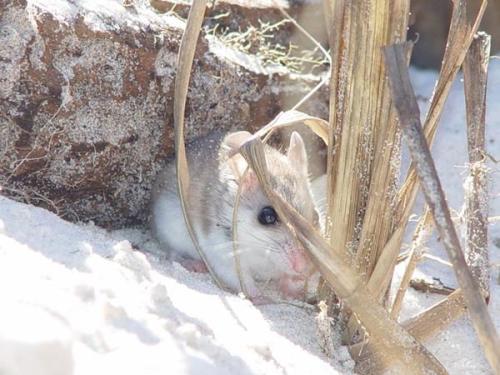 |
Dune Walkovers Protect Endangered Habitat in Alabama
The BLM manages 58.04 acres on Fort Morgan Peninsula in Alabama. Spanning six tracts of public domain lands, the area includes half a mile of beach front property along the Gulf shore, considered by many to be
some of the finest in the world. In the early 1950s, much of the public domain land on the Fort Morgan Peninsula was classified for disposal pursuant to the Small Tract Act of 1938. By 1960, most of the identified 190 small tracts had been sold to World War II veterans who were given a statutory
preference. However, six small tracts, totaling 28 acres, were specifically set aside by the classification orders and reserved as recreation areas for use by the general public. (My Public Lands
Tumblr)
|
|||
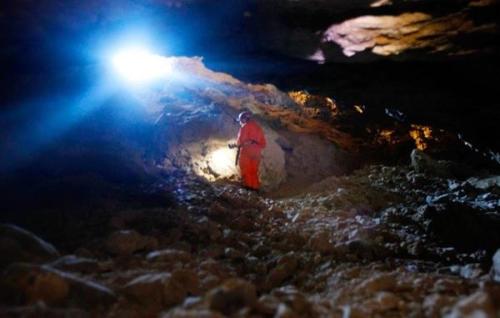 |
Battling White-Nose Syndrome in New Mexico
Hibernating bats in the Western U.S. are at risk from White-nose syndrome (WNS), a fungal infection that is nearly 100 percent fatal to infected individuals and can devastate bat colonies. BLM New Mexico is
working with multiple partners under authority of the 1988 Federal Cave Protection Act to protect bats in approximately 500 caves on public lands the agency manages from becoming infected. (My Public Lands
Tumblr)
|
|||
 |
Forestry Students Head West to the Mountains and the TreesThis winter the Yale-BLM Western Forest Crew completed its inaugural season with the Mother Lode Field Office in the foothills of the Sierra Nevada Mountains. Comprised of four graduate students from the Yale School of Forestry & Environmental Studies, the crew spent their entire winter break working with BLM Forestry on issues related to the current bark beetle epidemic centered in the Mother Lode region of California. (My Public Lands Tumblr) |
|||
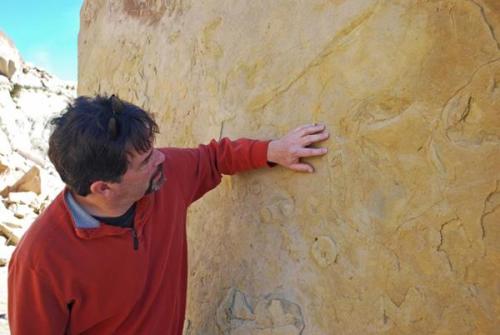 |
Socorro Field Office Dinosaur Tracks Featured in USA Today Article
Did therapod dinosaurs hunt in packs? There may be evidence they did, at least according to Paleontologist Doug Wolfe, whose research at a BLM trackway site in New Mexico is featured in a recent article in USA
Today. Wolfe discovered the site, featuring 13 therapod tracks, on BLM land in Catron County, New Mexico about 10 years ago. Therapods are a group of three-toed carnivorous dinosaurs that include the famous Tyrannosaurus rex. (My Public Lands Tumblr)
|
|||
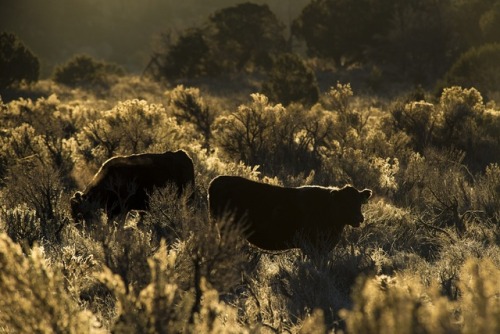 |
Grazing, Water, and Greater Sage-Grouse
For more than half a century, the BLM has proudly worked with the many thousands of American ranchers who graze their livestock on 155 million acres of our nation’s public rangelands. Drought can be
tough on wildlife and cattle in the northwest corner of South Dakota and on the fringe of sage grouse steppe. In 2012, a period of low rainfall caused creeks and small reservoirs in the region to deplete, which negatively affects grazing livestock as well as wildlife. Today, with new funds from the
Sage Grouse Initiative that help improve grazing systems, rancher Ron Steineke will at last have a reliable water source for livestock and wildlife, too. (My Public Lands Tumblr)
Related: How to Manage Rangelands and Greater Sage-Grouse Habitat (My Public Lands Tumblr) |
|||
| YOUR PUBLIC LANDS | ||||
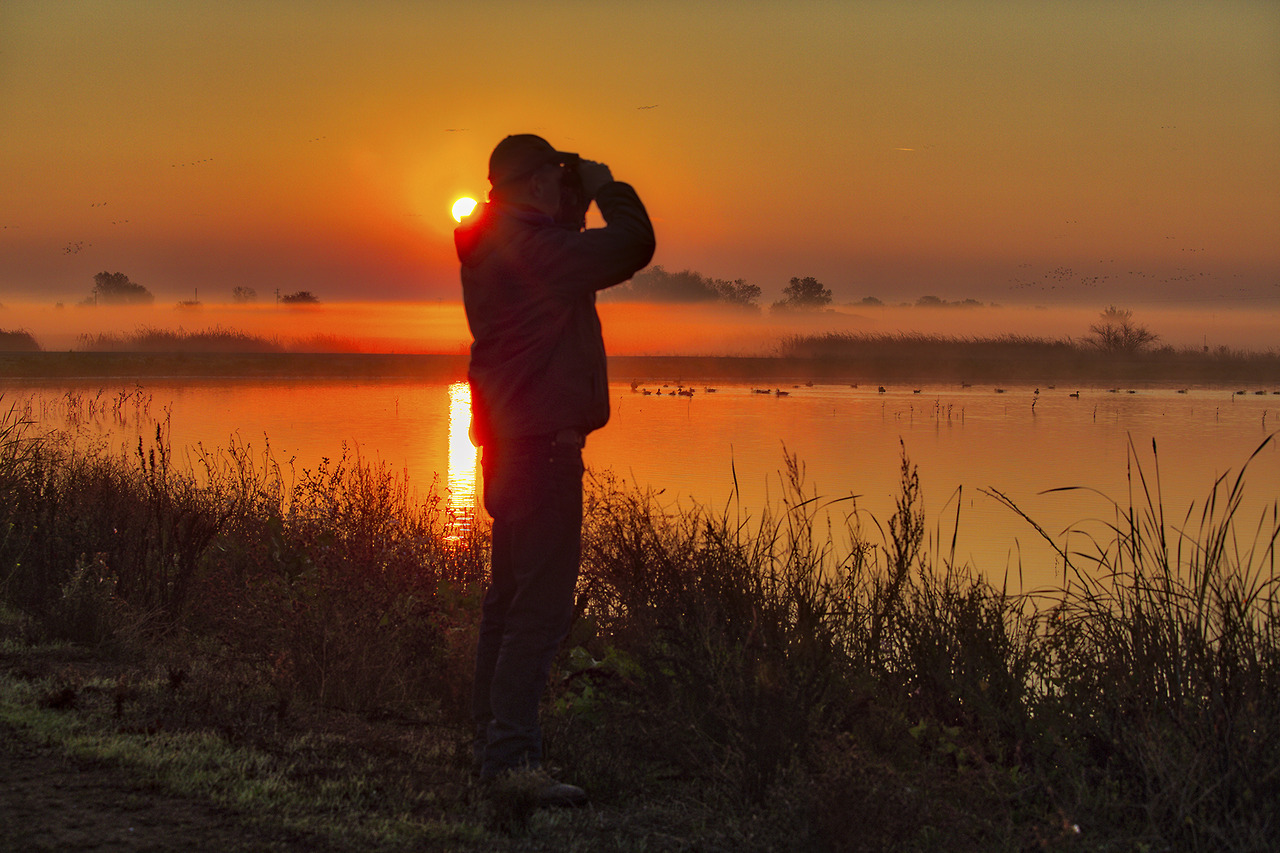 |
Hunting and Fishing are Key Parts of our Heritage and our Economy
On his first day on duty, Department of the Interior Secretary Ryan Zinke issued a secretarial order, which expands access to public lands and increase hunting, fishing, and recreation opportunities
nationwide. Secretarial Order 3346 advances conservation stewardship, improves game and habitat management, and increases outdoor recreation opportunities by directing bureaus and agencies to immediately identify areas where recreation and fishing can be expanded. The order also requests input from
the Wildlife and Hunting Heritage Conservation Council and Sport Fishing and Boating Partnership Council to provide recommendations on enhancing and expanding access on public lands and improving habitat for fish and wildlife. (My Public Lands Tumblr)
|
|||
 |
Track the Bloom
Hey, public lands visitors! The Bureau of Land Management in California, Nevada and Arizona want to share YOUR #superbloom photos from this epic year of precip. Help us #TracktheBloom by submitting your
wildflower photos from BLM-managed public lands on our social media platforms below. We will be featuring photo contributions on our channels as the flowers bloom. Happy photographing. (My Public Lands Tumblr)
Related: #TracktheBloom on Facebook and #TracktheBloom on Twitter |
|||
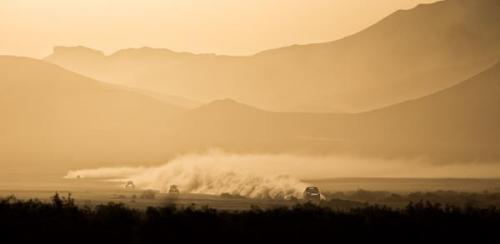 |
BLM Nevada Supports Desert Race – and Protects Desert Tortoises
The Mint 400, a legendary annual off-road vehicle race, was held on Saturday, March 4 in Primm, Nevada. The race, which holds the title as the oldest and most challenging off-road race in North America, is run
under a Special Recreation Permit issued by the BLM’s Southern Nevada District Office. The bone-jarring, 400-mile looped race, where competitors endure roaring clouds of dust, jagged rocks, and just about everything the Mojave Desert can throw at them, is as much a cultural event as it is a
test of endurance for the drivers. (My Public Lands Tumblr)
|
|||
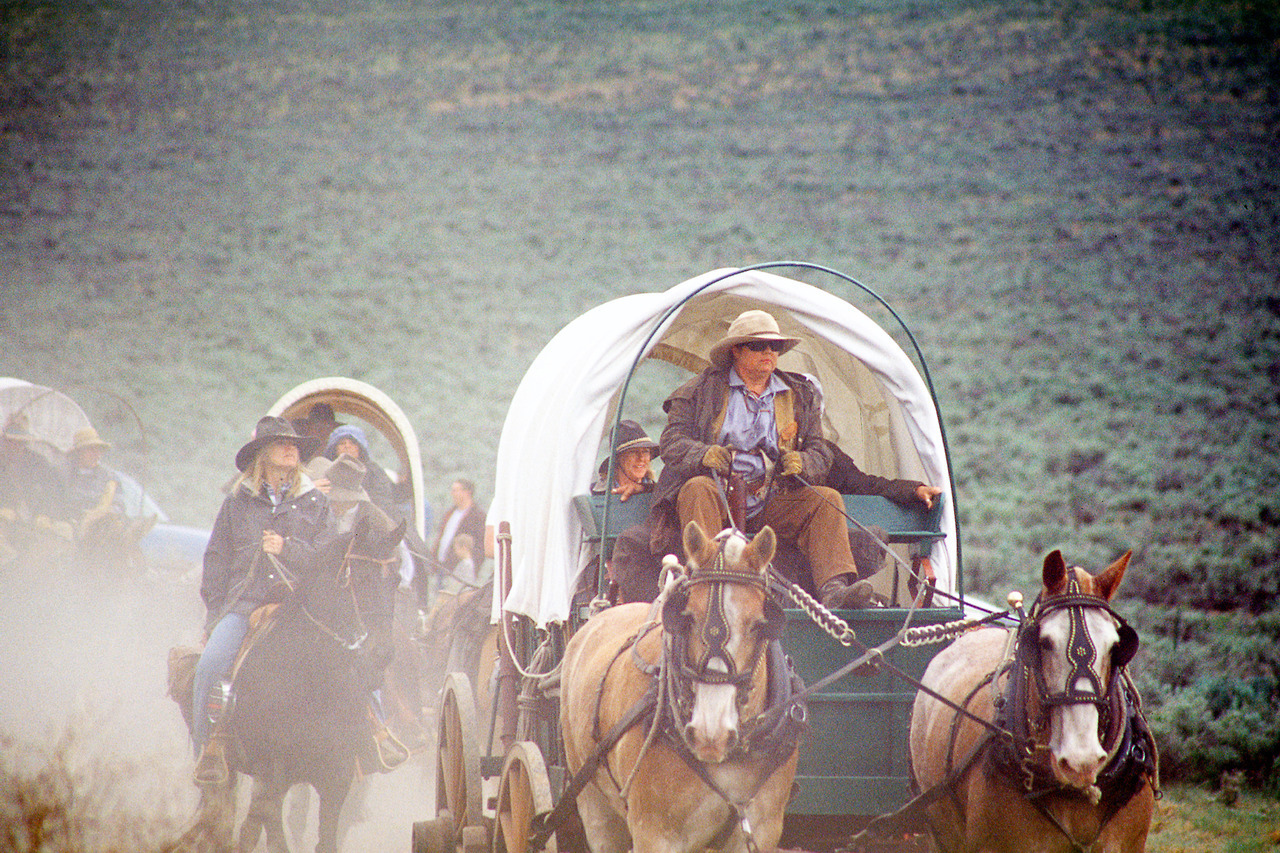 |
Step Back in Time on the Oregon Trail
Did you know that the Oregon Trail passes through land managed by the Bureau of Land Management? The Oregon Trail was a wagon road stretching 2170 miles from Missouri to Oregon’s Willamette Valley. It
was not a road in any modern sense, only parallel ruts leading across endless prairie, sagebrush desert, and mountains. From the 1840s through the 1880s, thousands trekked westward, carrying only a few belonging and supplies for the journey, and settling on the western frontier, forever changing the
American West. (My Public Lands Tumblr)
|
|||
| HEADLINES AND HIGHLIGHTS | ||||
 |
Interior names energy and mineral chief new acting BLM director
The Salt Lake Tribune, March 16, 2017 |
|||
 |
Secretary Zinke Issues Lease for 56 Million Tons of Coal in Central Utah
U.S. Department of the Interior Secretary Ryan Zinke announced the approval of a $22 million coal lease on the Greens Hollow tract in central Utah to Canyon Fuel Company, LLC, a subsidiary of Bowie Resource
Partners, LLC. Coal mining in the area currently supports nearly 1,700 mining and related jobs. Secretary Zinke also announced Bureau of Land Management (BLM) career veteran Michael Nedd will serve as Acting-Director of the BLM. Previously, Nedd served as Assistant Director for Energy,
Minerals, and Realty Management; his selection signals the Secretary's focus on elevating responsible energy development on public lands where appropriate. (Department of Interior News Release)
|
|||
 |
BLM’s Abandoned Mine Lands Program Goes ‘Down Under’
BLM’s Abandoned Mine Lands (AML) Program participated in the first annual “Dealing with Derelict Mines” conference, held in December in Singleton, New South Wales. (“Derelict
mines” is another term for abandoned mines.) The conference was organized by the Cooperative Research Centre for Contamination Assessment and Remediation of the Environment, a group which “brings together industry, government, science, and engineering to prevent, assess and clean up
environmental contamination”. The summit was done in collaboration with the University of Newcastle’s Global Centre for Environmental Remediation and the New South Wales Department of Industry. (My Public Lands Tumblr)
|
|||
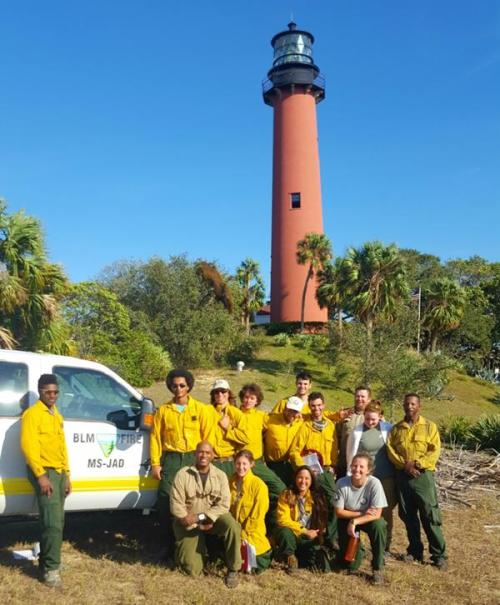 |
Jupiter Inlet Lighthouse Hosts AmeriCorps, Cleans Up after HurricaneThe Jupiter Inlet Lighthouse Outstanding Natural Area (ONA) in Florida hosted the AmeriCorps National Civilian Community Corps (NCCC) for two weeks in February. While there, nine NCCC members, aged 18-22 years old, worked tirelessly to mitigate the effects of Hurricane Matthew, which ravaged the eastern coastline last fall. The group came to Jupiter Inlet in response to the ONA’s application for disaster assistance, following an assessment of the damage left in Matthew’s wake. (My Public Lands Tumblr) |
|||
| WILDLIFE QUESTION OF THE WEEK | ||||
 |
How do fairy shrimp survive when their pools dry up?
a) They burrow deep underground to water hidden below the surface.
b) They gather together in a gelatinous mass that is able to persist through the heat of summer.
c) The adults die and the next generation awaits future rains in the form of egg cysts.
d) They grow wings and fly to permanent water bodies.
Keep reading for answer below. |
|||
| DOI HIGHLIGHTS | ||||
|
|
Ryan Zinke Sworn In as 52nd Secretary of the InteriorAs a fifth-generation Montanan who grew up in a logging and rail town near Glacier National Park, Zinke has had a lifelong appreciation for conserving America’s natural beauty while upholding Teddy Roosevelt’s vision of multiple-use on our public lands. (Department of Interior News Release)Related: Swearing-In Ceremony (The White House Facebook) |
|||
 |
President Trump Requests $11.6 Billion for Interior Department’s FY 2018 BudgetU.S. Secretary of the Interior Ryan Zinke announced President Trump’s $11.6 billion Fiscal Year (FY) 2018 budget blueprint request for the Department of the Interior. The budget meets the Department's core mission while also saving taxpayers $1.5 billion or 12 percent reduction from the FY 2017 Annualized Continuing Resolution level. (Department of Interior News Release) |
|||
 |
DOI Announces $3.74 Million to 12 States for Species Recovery
The Department of the Interior today announced that through the U.S. Fish and Wildlife Service’s (FWS) Cooperative Recovery Initiative (CRI) more than $3.74 million is being committed to nine
projects across 12 states to help recover some of the nation’s most at-risk species on or near national wildlife refuges. “We are targeting our work where it will do the most good for America’s resources,” said FWS Acting Director Jim Kurth. “This initiative is a unique
way to engage in conservation work with states and partners, giving the taxpayer a good return on investment.” (Department of Interior News Release)
|
|||
 |
Interior Department Auctions Over 122,000 Acres Offshore Kitty Hawk, North Carolina for Wind Energy Development
U.S. Secretary of the Interior Ryan Zinke and Bureau of Ocean Energy Management (BOEM) Acting Director Walter Cruickshank announced the completion of the nation’s seventh competitive lease sale for
renewable wind energy in federal waters. A Wind Energy Area of 122,405 acres offshore Kitty Hawk, North Carolina received the high bid of $9,066,650 from Avangrid Renewables, LLC, the provisional winner. Also participating in the lease sale were Wind Future LLC, Statoil Wind US LLC, and
wpd offshore Alpha LLC. (Department of Interior News Release)
|
|||
 |
Secretary Zinke Announces Proposed 73-Million Acre Oil and Natural Gas Lease Sale for Gulf of MexicoLease Sale 249 will include about 13,725 unleased blocks, located from three to 230 miles offshore, in the Gulf’s Western, Central and Eastern planning areas in water depths ranging from nine to more than 11,115 feet (three to 3,400 meters). (Department of Interior News Release) |
|||
|
|
Women’s History Month: Breaking the Glass Ceiling at Interior
March is Women’s History Month, and we’re honoring just a few of the notable women who broke the glass ceiling at Interior. Some of their accomplishments have been chronicled previously and
others are not well known. Learn what first inspired them to go where other women had not dared -- or had not been allowed -- to venture. (Department of
Interior blog) |
|||
| WILDLIFE QUESTION OF THE WEEK ANSWER | ||||
|
How do fairy shrimp survive when their pools dry up?
c) The adults die and the next generation awaits future rains in the form of egg cysts.
Fairy shrimp occur in vernal pools, which are only present on the landscape during wet portions of the year. When rains fill the pools, fairy shrimp hatch from awaiting egg cysts and quickly develop into
adults. Adults mate and new egg cysts develop in the female's brood pouch. Once the cysts are fully formed, they are released and sink to the bottom of the vernal pool. There they can persist through multiple years of drought, freezing and high temperatures until the next rains come. Some people
may know fairy shrimp as "sea monkeys," but remember, not all fairy shrimp require salty water! (Question provided by Carly Summers, BLM California Wildlife Biologist)
|
||||
|
||||








